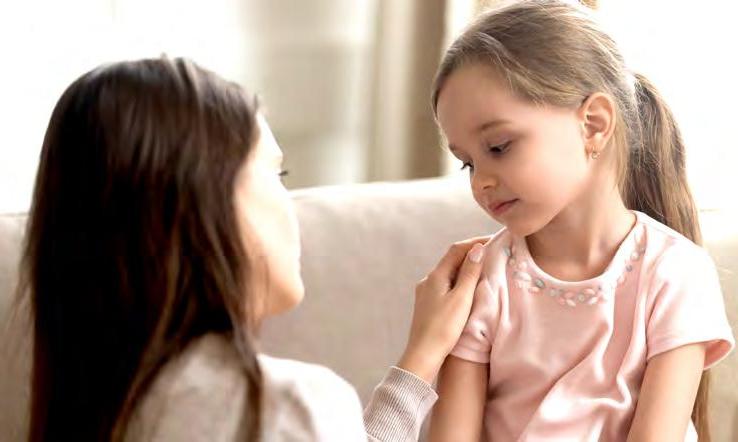
5 minute read
Coping with Back to School stresses
Coping with Back to School S tress
Starting a new school year after Covid-19 may mean both parents and children feel more anxious than usual. So how can we help our children go back to school feeling more happy and relaxed? Claire Winter speaks to some experts.
Consultant Clinical Psychologist, Dr Sarah Mundy from parentingthroughstories.com says it’s vital that we support our children to make sense of what we like to call the ‘new normal.’ She cautions against dismissing our kids’ emotions: “We need to support children to make sense of their feelings and the changes that the pandemic has caused. We need to normalise anxiety rather than dismiss it and help them (and parents and teachers) find ways of coping. Emotions are contagious so the more the adults and systems around children can model that they can cope, despite the uncertainty and collective anxiety, the better.”
Evidence Based Parenting and Education expert, Dr Kathy Weston (www. drkathyweston.com) says we also need to be positive about the return to school. If your child is worried remind them of:
The measures that the school is putting in place to keep children safe;
The things that can be controlled versus the things that can't;
The innovation that is happening in healthcare science to help us move towards eventual normality.
Kathy adds: “Beyond that, we need to remind children that their learning is important; school is a place where we go to work hard, grow and develop. We need to make our children feel like school is a happy, safe place to learn.”
Kathy’s other tips for parents include:
• Provide a positive home learning environment;
• Use effective praise to motivate your child. Children and young people respond to praise when it is sincerely given;
• Remember to be organised as a family during those first few weeks of term.
Perhaps create a daily check list of things that need to be remembered;
• Ensure your child gets enough sleep!
Children who are sleep deprived can feel more anxious, less resilient and can experience difficulty memorising and learning.
Education specialist and author of ‘100 Things to Learn Before you are 10’ Gail Hugman (www.lessonsalive.com) says it’s important to check in with your child regularly. “Have a chat with them about how they are adapting to the new school routine and friendships. Is everyone glad to be back? Is there anything they like better? Is there anything they miss? Do they feel worried about anything? Do they need to catch up with anything?”
In terms of school work, Gail says it’s important to remind your child what was achieved during lockdown. “Actively talk to them about the progress they made in any area (include maturity, self-control, confidence, new skills learned.) Also, remind them that the teacher also went through lockdown and isn’t expecting them to be perfect, just polite and well behaved!”
Gail says staying in touch with their teacher will also help. “Check in with them every now and then to make sure your child is on track, and to alert them if there are any worries. It is far better to deal with concerns early on, rather than have them build up.”
Last but not least, she suggests keeping one evening free a week to have fun. “Have a ‘no expectations, no pressure’ night. Films, games, popcorn, familiar, cosy things you did together during lockdown to relax the system and chill out!”
If you are worried about your child make sure you reach out to get help and reassurance from your child’s school. Remember though that learning how to cope with uncertainty will set your child up to be resilient and able to cope with change later in life.
How to Keep your Kids Stress Free
Natalie Costa, Confidence Coach for children and founder of Power Thoughts (www.powerthoughts.co.uk) shares her tips . Allow space to talk about their worries Listen to your child’s worries and validate their feelings. This allows them to feel connected, listened to and heard. It may be tempting to try to reassure by saying something like: "Oh don’t worry about that…” However, more helpful may be something like: “It’s ok to feel upset about this. Shall we look at what we can do to help you feel more prepared?” For those less inclined to talk, encourage drawing/writing out what’s on their mind. Creating a ‘worry character’ with a silly name and voice can help children recognise that they are not their worries. Remind them of their strengths Remind children of previous challenges, changes and, uncertainty they have faced. Create a poster about these. What did they learn from them? How did the challenges help them grow? Your child could also write themselves a letter reminding them that they are brave and can do difficult things. Encourage them to include the new and fun experiences that await them too. They can refer to this whenever they feel anxious about changes ahead.
Books to help with stress and anxiety
Recommendations from Dr Sarah Mundy, Consultant Clinical Psychologist and author from www.parentingthroughstories.com Coronavirus: A Book for Children about Covid-19 by Elizabeth Jenner, suitable for all ages. Illustrated by the brilliant Axel Scheffler and available in paperback, this accessible book provides clear explanations about Covid-19 and its impact on health and family life. Please Stay Here - I Want You Near is Dr Sarah Mundy’s first book in a series about Bartley Bear and his adventures as he navigates the challenges of growing up. This interactive book allows children ages 2 to 4 make sense of their own feelings and understand and cope with spending time away from their parents. The Goodnight Caterpillar by Lori Lite is a relaxation story for ages 4 to 9. The caterpillar teaches the child how to relax, unwind, and see things more clearly. This encouraging story quiets the mind and relaxes the body so your child can fall asleep peacefully. The Huge Bag of Worries by agony aunt Virginia Ironside is a brilliant book for ages 2 to 5 exploring emotions and wellbeing. Worry follows Jenny in a big blue bag; it’s there even when she is relaxing watching TV. Will Jenny get help to get rid of the worry?








